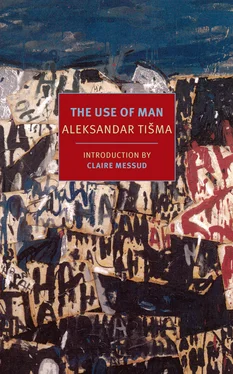Aleksandar Tišma - The Use of Man
Здесь есть возможность читать онлайн «Aleksandar Tišma - The Use of Man» весь текст электронной книги совершенно бесплатно (целиком полную версию без сокращений). В некоторых случаях можно слушать аудио, скачать через торрент в формате fb2 и присутствует краткое содержание. Год выпуска: 2014, Издательство: NYRB Classics, Жанр: Современная проза, на английском языке. Описание произведения, (предисловие) а так же отзывы посетителей доступны на портале библиотеки ЛибКат.
- Название:The Use of Man
- Автор:
- Издательство:NYRB Classics
- Жанр:
- Год:2014
- ISBN:нет данных
- Рейтинг книги:5 / 5. Голосов: 1
-
Избранное:Добавить в избранное
- Отзывы:
-
Ваша оценка:
- 100
- 1
- 2
- 3
- 4
- 5
The Use of Man: краткое содержание, описание и аннотация
Предлагаем к чтению аннотацию, описание, краткое содержание или предисловие (зависит от того, что написал сам автор книги «The Use of Man»). Если вы не нашли необходимую информацию о книге — напишите в комментариях, мы постараемся отыскать её.
A work of stark poetry and illimitable sadness,
is one of the great books of the 20th century.
The Use of Man — читать онлайн бесплатно полную книгу (весь текст) целиком
Ниже представлен текст книги, разбитый по страницам. Система сохранения места последней прочитанной страницы, позволяет с удобством читать онлайн бесплатно книгу «The Use of Man», без необходимости каждый раз заново искать на чём Вы остановились. Поставьте закладку, и сможете в любой момент перейти на страницу, на которой закончили чтение.
Интервал:
Закладка:
13
Street scenes. People strolling in twos and threes past shop windows displaying fabrics, wool, jersey, linen. Wishful faces; one leg at an angle in unconscious imitation of a posing mannequin. A little beggar, his short-cropped hair sticking up and eyes without pupils, sitting on the sidewalk against a wall, a black cap turned upside down between his bare feet. Bells ringing from the tower of the cathedral on Palm Sunday, children in new clothes, white knee socks, tiny bells on pink ribbons around their necks, clinging to the hands of grandmothers, who nod to each other in greeting. A column of soldiers with rifles, backpacks, rolled blankets across their packs, entrenching tools at their belts, and their boots crunching. Soldiers in 1940, in blue-gray uniforms with high collars and puttees; in 1942, in low boots and greenish uniforms, with the lightning bolt on their soft collars, caps low and angled to their faces; in 1956, in boots and olive-gray uniforms with gray ties. High-sided carts, a shovel planted at the top of a mound of coal. Carts with black rubber wheels, loaded with bottles of soda water, a chorus of a hundred voices, a hundred separate lakes gleaming through glass of different colors. Cabs with hoods in the shape of an open palm or a cabbage leaf. Streetcars swaying on sharp turns, their bells ringing. Buses taken by storm at lunchtime. Cars abandoned on the sidewalks of narrow streets, Baker Street, Furrier Street, Chandler Street, covered with dust, their windows gaping at the walls. Married couples with baby carriages on Sundays. A mob, their hands stuffed into their pockets, a threatening look in their eyes, released from movie houses. Seated in the sun on the wide sidewalk in front of the Queen Mary Hotel — formerly Queen Elizabeth, subsequently Erzsébet Királynő, still later Vojvodina — at marble tables inside a wrought-iron railing, over mugs of beer, glasses of slivovitz, cups of French coffee, merchants and tradesmen in bowler hats, officers of the Royal Army with their caps on the chairs beside them, actresses of the Serbian National Theater observing the scene through lorgnettes. A teen-agers’ “row”: a two-way battery of ardent glances and fixed smiles. The town’s eccentrics: the seller of lottery tickets, hunchbacked, with a white goatee; the hairless idiot poking his flute in young girls’ faces to play “Tamo daleko”; the woman in a long threadbare coat, gray hair hanging loose, wandering from shop to shop asking for empty boxes. Young girls in long skirts, like a shower in early summer washing the boredom off the dusty town. A woman in tight-fitting clothes, her legs the shape of upturned wine bottles, standing at the entrance to a department store. A woodcutter in a torn coat, two axes slung over his shoulder, a purple nose, a mustache white with frost, loitering on a winter morning in front of the Agricultural Bank. Two young teachers, one of history, the other of literature, the first straight-backed and balding, the second round-shouldered and with downcast, sad eyes, both gesticulating as they disappear into a restaurant. A truck with a bright-colored sign painted on its side and a loudspeaker in an inverted funnel on its roof, moving away as it announces that the circus has just arrived in town and is setting up at the fairground. Wreaths of multicolored lights, lanterns in the shop windows on New Year’s Eve, confetti scattered over the sidewalk. The emptiness of a public holiday, solitary drunks with foreheads pressed against the advertisement kiosks, girls laden with bags hurrying off to visit their aunts. The muffled darkness of night, with its street cleaners, lovers returning from trysts, night-shift workers hastening to the factories. Peasant girls in wide, brightly embroidered skirts on market days, hanging around dairy bars and the stalls on wheels that sell scarves and bathing suits. Regiments of bathers at the bus stop, coming from the Danube, in shorts, cheerful tee shirts, loose dresses, and children sucking lollipops, cheeks red from the sun and legs heavy with fatigue. In front of the theater in the evening: two or three long skirts and high heels crossing the yellow circles cast by the street lamps and going up the steep steps. Lemonade vendors beside white iceboxes with bell-shaped glass covers; ice-cream vendors beside two-wheeled carts with shiny tin lids in the shape of a snail’s shell and, on the top, a partitioned wooden box for the wafer cones; fruit-juice sellers with bottles lying flat on ice in the baskets of their bicycle carriers; bootblacks with little boxes and metal footrests between their legs. Street cleaners, each with a brush, a spade, and a tall cylindrical bin on wheels. The policeman on the corner, in his white peaked cap and long protective gloves of white canvas, stiffly and precisely indicating left, right, go, stop. Schoolchildren with their satchels plodding home, their dreamy eyes raised to the sky. A conversation at the corner: someone’s wife and someone’s husband, casting anxious looks around, afraid of being seen. Flower girls, baskets on their arms, making the rounds of the sidewalk cafés. Children selling almonds in little white bags. Flag-waving crowds on their way back from a soccer match, in lines of six or eight abreast, their open-necked shirts flapping, their faces dusty and covered with sweat. Draftees on their way to the station, arms around each other’s waists, free hands holding half-empty green bottles, singing off-key in hoarse voices. A wedding in front of the Town Hall: cars, the bride in her white dress and veil, the sharp cries of the children as they run after the tossed coins rolling away. Around three or four in the afternoon, linked by an invisible thread, men and women walk toward the cemetery, the space between them diminishing as they approach their destination. Stray dogs, trotting along, sniffing the air, keeping well away from humans. Pigeons on the church porch and along the main square. The Austro-Hungarian colonel Kranjčević, retired these forty years, taking from the pocket of his heavy overcoat a little bag of bread crumbs, tossing the crumbs onto the snow. Above him, a leaden sky.
14
Only Robert Kroner appreciated the aura of devotion that shone from Milinko, and it was questionable whether even his appreciation was sincere. It may have been the result only of the general decline of values around him. His wife interpreted the signs of the young man’s respect in terms of his humble origins and modest circumstances. Here she forgot her own hatred, fed by poverty, for the well-to-do and the established, a hatred that had included the Kroners while they were her masters.
Reza Kroner had only the vaguest notion of events outside her own home, especially developments of international importance, and failed to see that the social status she had achieved through her marriage was inexorably disintegrating, that the name Kroner was no longer a guarantee of esteem, of prestige, and that the days of the family’s material security and even physical safety were numbered. Since the birth of her son, who was to remain to the very end the apple of her eye, she saw those around her in terms of him and him alone. When Milinko first made his appearance at the house behind the Baptist church, there was nothing, in her eyes, that posed a threat to Gerhard’s future. Gerhard had finished school a year before the war and that autumn had enrolled in the Technical Institute in Belgrade. Even though his studies were interrupted the following April as a result of the outbreak of war, she was not worried, for as soon as the Institute closed its doors, her son came home again, back under her protection. That protection meant little for his career, since during the Occupation he was prevented from continuing his studies, but her love, pleased at the proximity of its object, had no difficulty in postponing the righting of this injustice to an indefinite future. The more so since her son himself did not seem particularly disturbed by it.
Читать дальшеИнтервал:
Закладка:
Похожие книги на «The Use of Man»
Представляем Вашему вниманию похожие книги на «The Use of Man» списком для выбора. Мы отобрали схожую по названию и смыслу литературу в надежде предоставить читателям больше вариантов отыскать новые, интересные, ещё непрочитанные произведения.
Обсуждение, отзывы о книге «The Use of Man» и просто собственные мнения читателей. Оставьте ваши комментарии, напишите, что Вы думаете о произведении, его смысле или главных героях. Укажите что конкретно понравилось, а что нет, и почему Вы так считаете.












